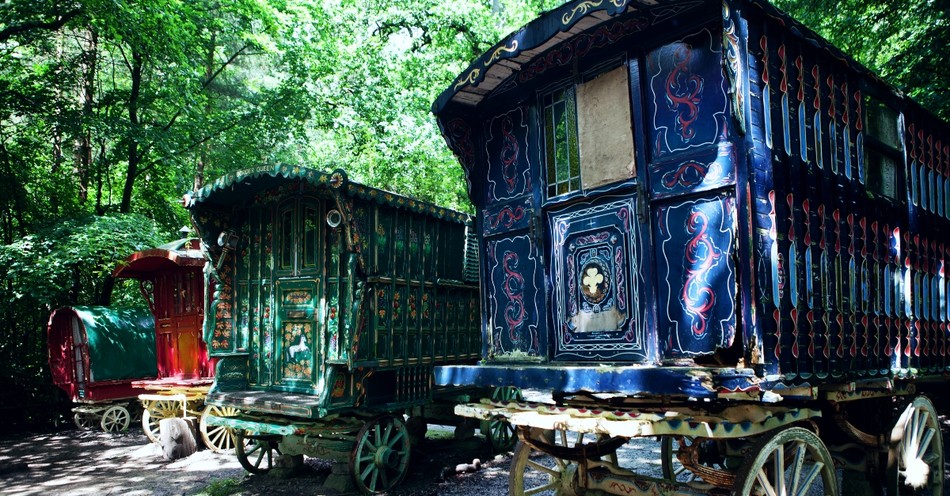Gypsies in the Modern World
A brightly colored wagon is pulled by a heavy horse through the streets of a village, past a post office, grocery store, and other shops. A dark-skinned man holds the reins, a woman of similarly dark complexion sitting next to him, wearing flowing clothes as bright as their wagon. They ignore the stares of villagers gathered to watch and jeer. Some yell “get lost, gyppoes!” A few secretly admire the teal, crimson, and ochre of the cart and the ornate flowers painted around their window shutters. Children approach to stroke the horse and thread flowers into its mane, but their parents pull them back with stern words of discipline.
This image is not outdated but pervasive in parts of the world, such as England, where Romani or Gypsies wander from village to village, typically unwanted and regarded with suspicion. Tension exists between the romantic portrayals of carefree gypsies and realistic scenes of rejection and fear. Who are the gypsies?
Definition of Gypsies
A gypsy is a member of a people originating in South Asia and traditionally having a wandering way of life, living widely scattered across Europe and North and South America and speaking a language (Romani) that is related to Hindi; a Romani person. Gypsy is also used as a description for a nomadic or "free-spirited" person, whose personality and lifestyle may be similar to historical gypsies.
Ancient Roots and Nomadic Occupations
Gypsies were initially thought to have come from Egypt, but they originated in India. Historians have traced their spread across all parts of the world and the prejudice which followed them. Oppression has caused these groups of people to remain close together; to intermarry, and to adhere to tradition. Some of these customs have included looking after the elderly people in one’s community and maintaining close family ties throughout one’s life. Gypsies are known for practicing trades outside the mainstream; portable trades. These include fortune telling, repairing metal tools, working with horses, and entertainment.
Mistreatment of Gypsies
“European nations over the centuries have enslaved, expelled, imprisoned, and executed Romani people. Other European nations used their legal system to oppress the Roma, passing laws prohibiting Romanies from buying land or securing stable professions.” Gypsies were often ejected from communities and forced to wander, preventing them from establishing stability and deep relationships with members of other communities. They could not obtain birth certificates or attend schools.
“Mass killings of Roma reached their pinnacle on July 31–August 2, 1944, when the Germans began the liquidation of the Zigeunerlager (‘Gypsy camp’) at Auschwitz-Birkenau” during the Nazi terror of World War II. Hundreds of thousands of Roma died. “Auschwitz was only one of the places where the Roma were systematically gassed and murdered. In other parts of Eastern Europe, the Roma were shot to death.”
Certain Christian churches throughout history also abused gypsies. “Romany children were often forcibly taken from their families to be raised by more acceptable Christian foster families.” This practice was officially carried on from the early 18th century until less than half a century ago. An organization, founded in Switzerland in 1926, arose to remove Romany children from their homes and erase their identities. “Pro Juventute” still exists in Switzerland and they only ended their “kidnapping practices in 1973.”
A news article, from as recently as August 2017, revealed that some residents of the Cotswolds in England were offended to discover that the Christian group who had booked a field to hold a rally were, in fact, Christian Gypsies. While people living in neighboring fields welcomed a gospel rally, associating such an event with peaceful behavior, their attitude changed when they discovered this Roma connection. The village claimed they had been duped. Police were called in to carefully monitor the event, attended by thousands, where the majority were expected to be non-believers and seekers.
Pastors always expect and welcome huge numbers of unbelievers to such rallies: “The biggest majority of people on here aren't practicing Christians” one of the rally’s leaders commented. “A gathering of 5-6,000 people of any race will cause disruption, as we have. We are open to anyone who wants to come up to see what's happening. We will give you tea and cake and sandwiches.” The commentator said he had “come to expect” discrimination.
Romani Religions of Gypsies
There are millions of Gypsies or Romani people (as they are also known) living around the world, representing all types of religions including Christianity. “Their heritage also is quite superstitious, and they often mix pagan thought with Christianity” such as belief in “charms, amulets, curses, bad luck, and ghosts.” Gypsies dutifully observe standards of ceremonial cleanness. For example, Romani women are held to strict standards of purity.
They are absolutely required to be virgins before marriage, and many rules dictate what a woman may or may not do during menstruation and after giving birth. The lower half of a woman's body is considered unclean due to menstruation; pregnant women are also considered unclean. After giving birth, whatever a new mother touches is to be destroyed. Other expectations and rules are similar to many legalistic religions and to a number of Jewish laws in the Old Testament. “Whenever a woman has her menstrual period, she will be ceremonially unclean for seven days. Anyone who touches her during that time will be unclean until evening” (Leviticus 15:19).
The Christian Response to Racism against Gypsies
The Bible teaches that everyone is a sinner (Romans 3:10–11, 23), and therefore separated from the One Holy God. Only Jesus, the Savior, can remedy our stance with Him (Romans 7:24–25; 1 Corinthians 6:11). We are not saved by following strict requirements or performing some sort of ritual, but by the grace of God received through faith in Jesus Christ (Ephesians 2:8–10).
“It is a ‘blasphemy’ against Christ to tolerate racism and discrimination against the Roma, Gypsy, and Traveller communities in the UK,” according to clergy who addressed the issue of institutionalized racism early in 2019. The Synod agreed to “combating racism towards traveling communities, to ministering to them, and to lobbying local authorities for more land to be made available for them.” “How do we blaspheme Christ today?” he asked. “He suggested that it was by a denial of common humanity — whether Gypsy, Jew, Greek, slave or free, Scottish, English, Irish, Welsh, or Arsenal fans. ‘This is why all forms of racism are so evil. They are not just a denial of our common humanity; they are an affront on God.’”
Racism against Roma, Gypsy, and Traveller communities was still common, and — “tragically and perversely” — often tolerated, he said.
Scripture agrees that racism is “a direct affront to God and an insult to the entire human family. Gypsies relate to Christ” according to Focus on the Family because “all are one in Christ Jesus” (Galatians 3:28). Revelation 14:6 says “Then I saw another angel flying in midair, and he had the eternal gospel to proclaim to those who live on the earth — to every nation, tribe, language and people.”
Are All Gypsies Sojourners?
Large numbers of UK Gypsies have come to Christ in the past decades: perhaps they identify with the sojourner state of God’s people. Gyspy is synonymous with a wanderer or a person with no permanent home, and God’s people have often been gypsies, exiled from home, and enslaved in foreign lands. Ezra wrote, “For we are strangers before you and sojourners, as all our fathers were. Our days on the earth are like a shadow, and there is no abiding” (1 Chronicles 29:15).
The Apostle Paul stressed that our homes cannot be located externally; they have no doors, windows, or addresses: “Do you not know that you are God’s temple and that God’s Spirit dwells in you?” (1 Corinthians 3:16). This temple is pre-loaded and travel-ready. “But our citizenship is in heaven, and from it, we await a Savior, the Lord Jesus Christ” (Philippians 3:20). This is our promise and reminder — spiritually we are just like the Christian Roma, living and worshiping in temporary accommodation, looking forward to the eternal residence with Jesus.
©iStock/Getty Images Plus/tlnors









